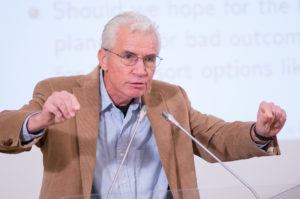Terrible news about the death of Martin Weitzman, a brilliant economist best known for his groundbreaking work on the risks of climate change.
He went against the conventional approach, which is to calculate the so-called social cost of carbon, based on what we think we know about the most likely climate change scenarios. The idea is that this social cost then determines how much we spend on mitigating the risks – preferably by means of a carbon tax to put a price on each unit of carbon emitted.

That all sounds very rational – but Weitzman urged us to think again. What we should be most concerned with is not what we know, but what we don’t know; and furthermore we should act in accordance not with the most likely scenarios, but the more extreme possibilities. Statisticians call these the “tail risks” because in a normal bell curve of probabilities – the most unlikely (but highly consequential) outcomes are described not by the hump in the middle of the curve, but the long, flattish bits at either end – i.e. the tails.
When you insure your house you don’t care about the most likely scenario (i.e. that your house won’t burn down), you care about the remote possibility that it might. It’s not the likelihood of that tail risk that determines what you spend on insurance, but the ruinous consequences that such an outcome would have on your life.
Weitzman argued that this is how we should think about the economics of climate change – as a kind of planetary fire insurance.
It’s a powerful analogy, all the more so when one considers that, unlike house fires, for which we have a firm basis of evidence on which calculate the risk of a particular house burning down, there’s still a lot we don’t know about the risks of climate change.
The global climate is a vastly complex system which we’re messing about with by burning millions of years worth of fossil fuel deposits in a geological blink of an eye. We still don’t know what the full consequences of this interference will be.
The foolish response to this lack of knowledge, is to carry on regardless until we have further information. The wise response is to see what we don’t know as a spur to action not an excuse for complacency – especially when it comes to the only planet that we have to live on.










Join the discussion
Join like minded readers that support our journalism by becoming a paid subscriber
To join the discussion in the comments, become a paid subscriber.
Join like minded readers that support our journalism, read unlimited articles and enjoy other subscriber-only benefits.
Subscribe